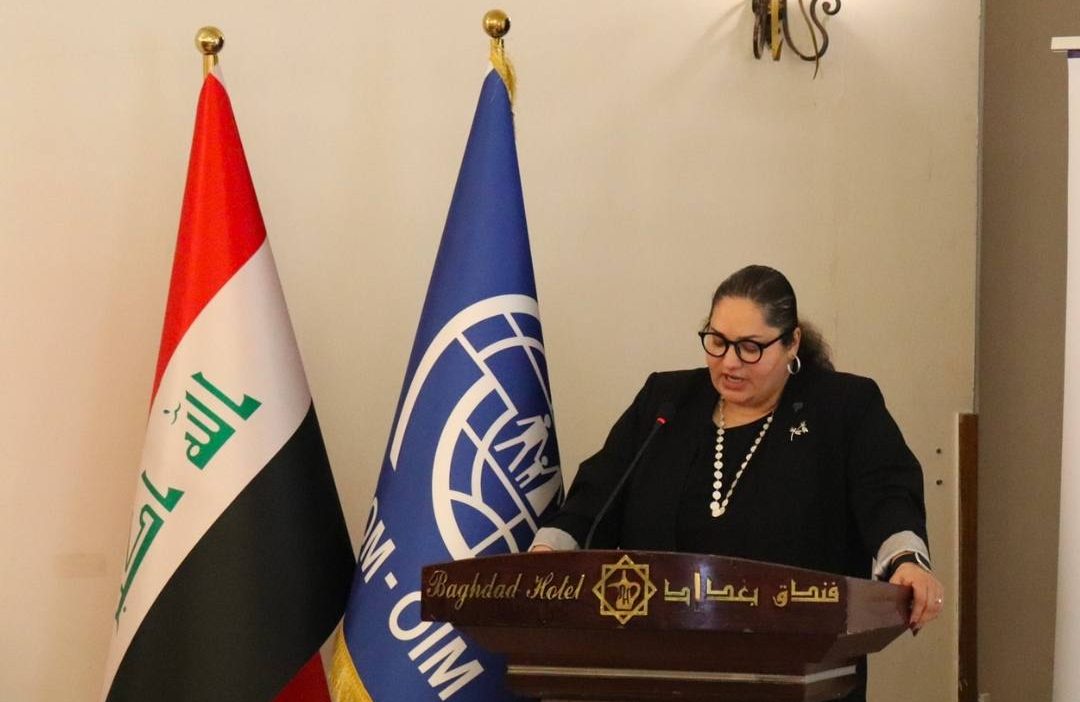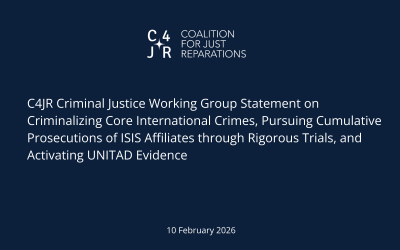Baghdad (March 1, 2022) – Exactly one year ago today, on 1 March 2021, the Iraqi Council of Representatives passed the Yazidi Survivors Law (YSL). The passing of the YSL marked an important milestone in Iraq’s post-conflict recovery period, as it promises to deliver long-awaited relief not only to Yazidi women but also to survivors belonging to several other ethnoreligious communities targeted by the self-declared Islamic State of Iraq and the Levant (ISIL). Additionally, this groundbreaking law is one of the very few examples of states taking deliberate action to specifically address the rights and needs of survivors of conflict-related sexual violence (CRSV). The Coalition for Just Reparations (C4JR), an alliance of Iraqi NGOs calling for comprehensive reparations for all survivors of the ISIL conflict in Iraq, actively engaged in advocating for the passage of this vitally important legislation.
However, any law is only as good as its implementation. Some steps have already been taken to implement the Yazidi Survivors Law, including the appointment of the Director-General of the Directorate for Survivors’ Affairs (a special body established to facilitate implementation of the law), and the opening of a temporary office in Mosul to accommodate this Directorate. Though regulations to guide the implementation process have been enacted, substantial effort will be required to ensure that this process is effective, accessible, and accountable and that survivor-friendly solutions, such as those previously suggested by the C4JR, are integrated.
We are now entering a critical window in which the groundwork for effective and survivor-centered implementation of the Yazidi Survivors Law should be laid. For this effort to succeed, we must build upon the achievements of the Directorate to date, as significant changes could halt or even revert the implementation process. Additionally, the Directorate must be allowed to select and hire qualified, permanent staff, not only to secure the expertise necessary to deliver on the law’s promises but also to ensure adequate representation of ISIL affected communities. This may, in and of itself, be considered a form of reparation and set an example to be followed by other public entities.
We want to reiterate once more that the process of submitting and deciding on claims and delivering concrete reparation measures will determine the overall success of the Yazidi Survivors Law. A survivor-centered approach should, therefore, be front and center in all implementation efforts. A truly survivor-centered approach will, at minimum, entail: regularly consulting survivors from all four recognized beneficiary communities during all stages of the implementation process; establishing branches of the Directorate in close proximity to survivors; employing Directorate staff from conflict-affected communities to ensure the availability of culturally and contextually sensitive support; requiring mandatory training for implementing institutions and personnel on ethical, trauma-informed engagement with survivors, including basic trauma understanding and awareness, confidentiality and informed consent requirements, and the do-no-harm principle; adopting a code of conduct that applies to all staff working on YSL implementation; providing survivors with credible information on application, review, and distribution procedures at all times; putting in place safeguards to avoid stigmatization and re-traumatization of survivors during outreach, application, review, and delivery of benefits and services, and establishing an effective and independent complaint mechanism to facilitate anonymous reporting of any violations; ensuring that survivors appearing before the Committee for an interview are entitled to the accompaniment of a person of their choosing; and adopting a relaxed evidentiary standard for verifying claims in order to protect survivors from invasive and violating methods of investigation and avoid placing any undue administrative and financial burdens upon them.
While efforts to develop robust outreach, application, and verification procedures are already underway, the question of ensuring sufficient and timely funding for the implementation of the Yazidi Survivors Law remains crucial. Apart from the preliminary emergency funding allocated in 2021, no financial means have, as of yet, been envisaged to support the sustainable and thorough implementation of the law in 2022.
Therefore, it is of critical importance to earmark sufficient funding for the implementation of the Yazidi Survivors Law in the Iraqi Federal Budget for 2022. The Government of Iraq must allocate adequate funds to allow for proper resourcing and staffing of the Directorate for Survivors Affairs and sub-offices to ensure that implementing institutions are equipped to successfully oversee this important work. Additionally, the Government of Iraq must allocate adequate funds to allow for the full satisfaction of all benefits promised under the law to eligible survivors, including salaries, housing, public employment, health care and mental health support, and education.
Great progress has undoubtedly been made through the passage of the Yazidi Survivors Law, but without sustained dedication, this law will remain on paper and its promised benefits will not reach survivors in need, many of whom still linger in IDP camps or live under the poverty line, traumatized, without access to services, and without recognition. Let us not forget that delayed and ineffective implementation of the Yazidi Survivors Law prolongs the agony of survivors, their families, and affected communities. Iraqi authorities must, therefore, demonstrate renewed commitment to supporting ISIL survivors and continue to set an example for the world by ensuring that the opportunities made possible through this law don’t remain unrealized.
In 2021, Iraqi decision-makers showed great courage and leadership by legislating the Yazidi Survivors Law. In 2022, they must breathe life into it by ensuring that resources are available to repair the harm done to survivors of ISIL crimes in Iraq.


